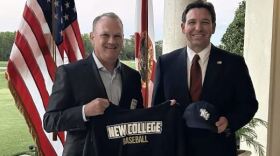WASHINGTON — The Trump administration imposed sanctions Friday on Colombian President Gustavo Petro, his family and a member of his government over accusations of involvement in the global drug trade, sharply escalating tensions with the leftist leader of one of the closest U.S. allies in South America.
The Treasury Department leveled the penalties against Petro; his wife, Veronica del Socorro Alcocer Garcia; his son, Nicolas Fernando Petro Burgos; and Colombian Interior Minister Armando Alberto Benedetti.
Petro "has allowed drug cartels to flourish and refused to stop this activity," Treasury Secretary Scott Bessent said in a statement. "President Trump is taking strong action to protect our nation and make clear that we will not tolerate the trafficking of drugs into our nation."
The move ramps up a growing clash between the Republican U.S. president and Colombia's first leftist leader, notably over deadly American strikes on alleged drug-carrying boats off South America.
This week, the Trump administration expanded its crackdown to the eastern Pacific Ocean, where much of the cocaine from the world's largest producers, including Colombia, is smuggled. And in an escalation of military firepower in the region, the U.S. military is sending an aircraft carrier to the waters off South America, the Pentagon announced Friday.
The U.S. last month added Colombia, the top recipient of American assistance in the region, to a list of nations failing to cooperate in the drug war for the first time in almost 30 years.
The penalties were expected after Trump recently said he would slash assistance to Colombia and impose tariffs on its exports, referring to Petro on social media in recent days as "an illegal drug leader."
"He's a guy that is making a lot of drugs," Trump told reporters in the Oval Office on Wednesday. "He better watch it, or we'll take very serious action against him and his country."
After Trump accused him of having ties to drug trafficking, Petro on Wednesday said he would resort to the U.S. court system to defend himself.
"Against the calumnies that high-ranking officials have hurled at me on U.S. soil, I will defend myself judicially with American lawyers in the U.S. courts," Petro wrote on X without naming Trump but citing a news report about his comments.
A day earlier, Petro's anti-drug policy was the subject of a meeting between him and the U.S. chargé d'affaires in Colombia, John T. McNamara. McNamara also met with Foreign Minister Rosa Yolanda Villavicencio Mapy on Thursday.
Petro has repeatedly defended his policy, which moves away from a repressive approach and prioritizes reaching agreements with growers of coca leaf — the raw material for cocaine — to encourage them to switch to other crops, pursuing major drug lords and combating money laundering. He has said his government has achieved record cocaine seizures and questioned U.N. figures showing record coca leaf cultivation and cocaine production.
The amount of land dedicated to cultivating coca, the base ingredient of cocaine, has almost tripled in the past decade to a record 253,000 hectares (625,000 acres) in 2023, according to the latest report available from the U.N. Office on Drugs and Crime. That is about triple the size of New York City.
The Trump administration has surged military ships and planes to Latin America to target traffickers accused of funneling drugs to the U.S. Petro has pushed back against the strikes that have killed at least 37 people since they started last month, with the latest two targeting vessels in the eastern Pacific, where Colombia has a coastline.
Petro has repeatedly feuded with Trump this year. Petro initially rejected U.S. military flights of deported migrants, leading Trump to threaten tariffs. The State Department said it would revoke Petro's visa when he attended the U.N. General Assembly in New York because he told American soldiers to disobey Trump's orders.
Copyright 2025 NPR








